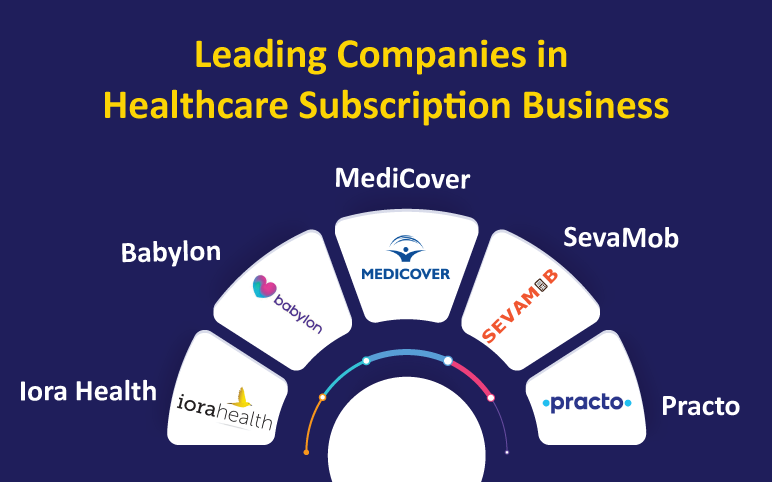Is Subscription Model Going to be the New Normal for Healthcare Industry?
Nov 11, 2020
Table of Contents
Over the years, technology has significantly transformed the whole experience of how we interact and receive services for our daily needs. Be it travelling, shopping, groceries, dining, banking, or any other day to day activity almost every sector has got revolutionised according to our requirement. Not only has the way we consume changed, but the way we pay for our services has changed as well.
With the rapid growth and advancement in technology, the payment process and method for these services has revamped. The one-time purchase model is getting replaced by subscription-based business models. The subscription-based business model is a type of recurring payment structure model in which the consumer pays set price for the monthly, yearly or for a predefined interval of time for the products and services received. The subscription-based model is already successful in many industries, such as entertainment. The subscription-based model not only adds value for customers and enhances their experience but also ensures a strong and long-term relationship between the service provider and consumers. For consumers, the model proves to be pocket-friendly, whereas, for service-providers the model acts as an early harbinger of pre-set revenue for a particular period of time.
A similar trend now can be witnessed in the healthcare industry, as it has started to route towards the subscription model. Today, there is a lot of discussion around how the subscription-based model works in Healthcare, what will be its benefit, and whether it will be successful or not.
Subscription Model In Healthcare Domain
The healthcare industry today mostly follows a traditional fee-for-service payment structure. For every visit, the patient pays a fixed amount of charge for the services received. However, the subscription model follows quite a different league from the existing payment structures. Just like the subscription-based models in other sectors, the healthcare subscription-based model offers the patient the access to the healthcare services such as primary care, specialist consultant, insurance and telehealth services by paying a fixed monthly, quarterly or annual fee to the hospital or the healthcare care provider depending on his needs and care required.
This Subscription model is more affordable, accessible, convenient and transparent as compared to the traditional pay-per service model. It provides customers with an opportunity to opt-in or opt-out of service anytime. If the customer is unsatisfied with the service, he can opt-out from the particular practitioner or even form a service provider and can switch to another better service provider.
Healthcare Subscription Model Benefit and Scope
The subscription model is equally beneficial for both the service provider and the seeker. For healthcare providers such as hospitals, it helps them to predict the demand and supply easily. With the recurring pricing model, they can predict the revenue, and they can maintain their budget accordingly. Once the regular income is ensured, the provider can focus on the quality of service delivery. Apart from the revenue, the subscription model helps companies to broaden their loyal customer base along with it also helps them to foster a long-term relationship with customers. The doctors can pay due attention and time to each patient. Instead of the number of patients served, they can focus on the quality of care provided, which will ensure a better health outcome for patients.
The subscription model has a lot of benefit to the subscriber or customer as compared to the service provider. In fact, from the initial observation, we can say that it is a highly customer-centric business model. From the free consultation to discounts on medicines and tests, to the minimal amount for trying new products or services, the subscription-based business model from time to time provides many exciting and attractive offers to the customer. As of now, the customer has to pay a varying amount of fee for each visit to the doctor, and sometimes the budget may get out of pocket. The subscription will ensure regular checkups, routine monitoring, and easy diagnosis of a disease that gets often delayed due to ignorance.
Drawbacks and Limitation of Healthcare Subscription Model
Despite several benefits, the Healthcare Subscription Model has few drawbacks that limit its wide-scale implementation. Today, there is a shortage of healthcare professionals in some developing countries, for those countries to adopt a subscription model would be difficult. Majority of the poor and uninsured population may not be able to afford the upfront subscription fee. Similarly, if a large number of doctors move on to the adopt subscription model, it will leave a vast population without healthcare service. Also, in some cases, the service provider may limit the number of services provided for the amount paid. Unregulated insurance is another issue in the healthcare subscription model. In some cases, the insurance provider may not cover the lab work, tests and diagnostics, imaging, speciality surgery and prescription drugs.
Issues in payment gateways, the chances for fraudulent transactions, privacy, data security and risk management are some of the problems that may arise from the technological front.
Latest Trends and Key Companies in Healthcare Subscription Business
Due to the variety of services offered by the subscription model in healthcare, it is known by many names such as membership medicine, concierge medicine, direct primary care and many others. The healthcare subscription-based companies offer various plans to cater the healthcare needs of the patients. Apart from health care services, the healthcare subscription is in use for personal health coaching, diagnostics, testings, screening and in preventive healthcare products.
To gain profit and early competitive advantage, companies have started rolling out several benefits & rewards programs for their customers such as comprehensive appointment, unlimited texting, discounts on specialist consultation services, low-cost testing, diagnostic and check-up services, employees’ medical plans and many others.
As of today, worldwide many companies are operating in the healthcare subscription business. Some of the key companies include –
Practo – Founded in 2009, Practo is one of the leading healthcare technology companies in India. Today, Practo serves over 2 crore users every month. It provides various healthcare subscription plans including options for whole families also. Subscription plans have unique benefits such as unlimited consultations, 24/7 access to doctors, video consultations, and many other such services.
Iora Health – Iora Health is a primary care startup based in the USA. Iora offers subscription-based healthcare services. It also offers health coaches for each patient, a collaborative care technology platform, wellness classes and groups like yoga and diabetes management.

Babylon – Based in London, United Kingdom, Babylon offers subscription-based telemedicine services. Babylon provides 24/7 instant access to doctors, therapists and specialists. Since its foundation in 2013, Babylon has expanded internationally and today, provided services in countries such as the USA, Rwanda, Canada, Singapore and many others.
SevaMob – SevaMob provides subscription-based preventative care and regular checkups to the low-income group in India. The company has also launched the Telehealth services to provide video consultations services.
MediCover – MediCover is a Poland-based healthcare and diagnostic services provider company. It provides subscription-based healthcare services to its customers in over 13 countries across the globe.
Apart from these, 1Life Healthcare, Falck, Talkspace are some of the leading companies in the healthcare subscription business.
What Does the Future Hold for Healthcare Subscription Model
The subscription model right now is in the infant stage in the healthcare domain. As of now, there are a few hurdles in its implementation. However, some of the critical factors such as the growth of telemedicine/remote monitoring, increase in the working young age population, data privacy & security, smooth payment methods and options, are likely to provide momentum to the growth of subscription models in healthcare in the coming years.
Downloads
Article in PDF
Recent Articles
- Major Highlights of ASH 2021 Annual Meeting: Stay abreast of the fresh developments!!
- Healthcare Delivery System: What lies in the future?
- Healthcare in 2021: Top Disruptions Bound To Impact The Way Healthcare Is Delivered
- Where Women Healthcare Stands
- How Blockchain is Transforming the Healthcare Industry?



